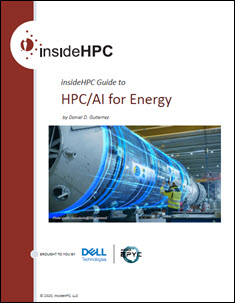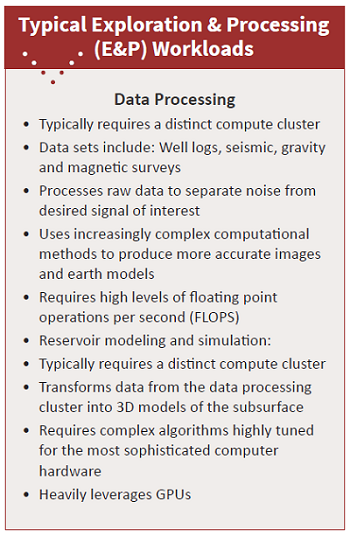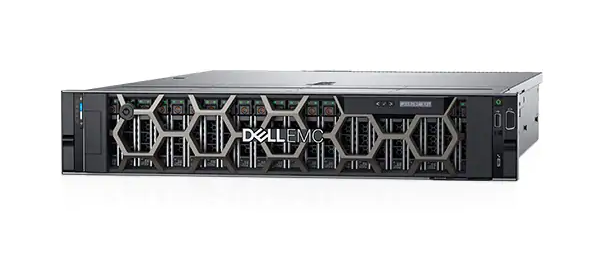 In this technology guide sponsored by our friends over at Dell Technologies, we take a deep dive into how the team of Dell Technologies and AMD is working to provide solutions for a wide array of needs for more strategic cultivation of oil and gas energy reserves. We’ll start with a series of compelling use-case examples, and then introduce a number of important pain-points solved with HPC and AI. We’ll continue with some specific solutions for the energy industry by Dell and AMD. Then we’ll take a look at a case study examining how geophysical services and equipment company CGG successfully deployed HPC technology for competitive advantage. Finally, we’ll leave you with a short-list of valuable resources available from Dell to help guide you along the path with HPC and AI.
In this technology guide sponsored by our friends over at Dell Technologies, we take a deep dive into how the team of Dell Technologies and AMD is working to provide solutions for a wide array of needs for more strategic cultivation of oil and gas energy reserves. We’ll start with a series of compelling use-case examples, and then introduce a number of important pain-points solved with HPC and AI. We’ll continue with some specific solutions for the energy industry by Dell and AMD. Then we’ll take a look at a case study examining how geophysical services and equipment company CGG successfully deployed HPC technology for competitive advantage. Finally, we’ll leave you with a short-list of valuable resources available from Dell to help guide you along the path with HPC and AI.
This technology guide, insideHPC Guide to HPC/AI for Energy, explores how the dynamic confluence of HPC and AI is now considered essential to any organization involved in energy exploration and the process of bringing the resulting energy resources to market.
HPC/AI Technology for Energy
The Oil and Gas industries represented some of the first to appreciate the potential for using different compute architectures for different processing workloads to increase and maximize performance. Combining serial processing CPUs, such as AMD EPYC, with high-performance, parallel GPUs, including AMD Radeon Instinct™, is the new standard for the best performing HPC systems. And the importance of software cannot be overlooked. The key to unlocking required potential in software is an open ecosystem like the one AMD established with ROCm.
The energy industry is unique in its Intensive compute requirements for seismic processing, reservoir simulation, and high-dimension data visualization used to shave costs and secure competitive advantage. We’re seeing deployments with AMD EPYC-processor-based (7001 and 7002 Series) PowerEdge servers, specifically for HPC, AI, and data analytics:
- Dell EMC PowerEdge R7525
- Dell EMC PowerEdge C6525
- Dell EMC PowerEdge R7515
 In a similar light, the storage needs for HPC solutions for the energy industry are equally intense. For example, a single seismic survey can result in hundreds of terabytes of data that require processing before they can be turned into visualizations that pinpoint oil reserves. Needless to say, a serious storage solution is required to support the constant deluge of data.
In a similar light, the storage needs for HPC solutions for the energy industry are equally intense. For example, a single seismic survey can result in hundreds of terabytes of data that require processing before they can be turned into visualizations that pinpoint oil reserves. Needless to say, a serious storage solution is required to support the constant deluge of data.
Dell Technologies provides a number of mission critical storage solutions to satisfy these needs, such as the Dell EMC PowerScale scale-out NAS solution for oil and gas customers. Another storage solutions is Dell Technologies on Demand for storage combine cost effective, scalable and resilient data storage with native public cloud services to deliver the best of both worlds for cloud. These solutions are ideal for deploying demanding, data-intensive applications on multiple public clouds.
Further, Dell EMC DataIQ is an unstructured data set management and insights software solution, allowing oil and gas companies to visualize all data through a single lens, effectively breaking down multiple silos of trapped data.
Dell EMC PowerEdge R7525 servers
 The Dell EMC PowerEdge R7525 rack server is a highly adaptable rack server designed to deliver powerful performance and flexible configurations ideal for compute intensive energy industry applications. The PowerEdge R7225 is powered by AMD EPYC processors.
The Dell EMC PowerEdge R7525 rack server is a highly adaptable rack server designed to deliver powerful performance and flexible configurations ideal for compute intensive energy industry applications. The PowerEdge R7225 is powered by AMD EPYC processors.
Over the next few weeks we will explore how with the accelerated use of HPC and AI in the energy industry, there are strategic options for laying a directed path for these technologies to become a strong competitive advantage. Dell Technologies and AMD is a team that can help you travel down this path:
- HPC/AI for Energy – An Overview
- Use Cases: HPC/AI for Energy
- Energy Industry Pain-Points Solved by HPC/AI
- HPC/AI Technology for Energy
- Case Study: CGG, Next Steps with Dell Technologies Solutions for the Energy Industry, Summary
Download the complete insideHPC Guide to HPC/AI for Energy, courtesy of Dell.



